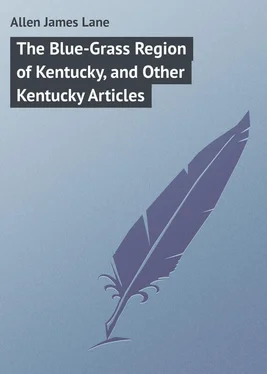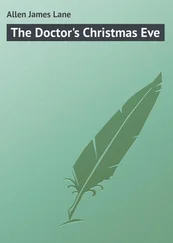James Allen - The Blue-Grass Region of Kentucky, and Other Kentucky Articles
Здесь есть возможность читать онлайн «James Allen - The Blue-Grass Region of Kentucky, and Other Kentucky Articles» — ознакомительный отрывок электронной книги совершенно бесплатно, а после прочтения отрывка купить полную версию. В некоторых случаях можно слушать аудио, скачать через торрент в формате fb2 и присутствует краткое содержание. Жанр: foreign_prose, Путешествия и география, на английском языке. Описание произведения, (предисловие) а так же отзывы посетителей доступны на портале библиотеки ЛибКат.
- Название:The Blue-Grass Region of Kentucky, and Other Kentucky Articles
- Автор:
- Жанр:
- Год:неизвестен
- ISBN:нет данных
- Рейтинг книги:3 / 5. Голосов: 1
-
Избранное:Добавить в избранное
- Отзывы:
-
Ваша оценка:
- 60
- 1
- 2
- 3
- 4
- 5
The Blue-Grass Region of Kentucky, and Other Kentucky Articles: краткое содержание, описание и аннотация
Предлагаем к чтению аннотацию, описание, краткое содержание или предисловие (зависит от того, что написал сам автор книги «The Blue-Grass Region of Kentucky, and Other Kentucky Articles»). Если вы не нашли необходимую информацию о книге — напишите в комментариях, мы постараемся отыскать её.
The Blue-Grass Region of Kentucky, and Other Kentucky Articles — читать онлайн ознакомительный отрывок
Ниже представлен текст книги, разбитый по страницам. Система сохранения места последней прочитанной страницы, позволяет с удобством читать онлайн бесплатно книгу «The Blue-Grass Region of Kentucky, and Other Kentucky Articles», без необходимости каждый раз заново искать на чём Вы остановились. Поставьте закладку, и сможете в любой момент перейти на страницу, на которой закончили чтение.
Интервал:
Закладка:
The typical boy on a Kentucky farm was tenderly associated from infancy with the negroes of the household and the fields. His old black "Mammy" became almost his first mother, and was but slowly crowded out of his conscience and his heart by the growing image of the true one. She had perhaps nursed him at her bosom when he was not long enough to stretch across it, sung over his cradle at noon and at midnight, taken him out upon the velvety grass beneath the shade of the elm-trees to watch his first manly resolution of standing alone in the world and walking the vast distance of some inches. Often, in boyish years, when flying from the house with a loud appeal from the incomprehensible code of Anglo-Saxon punishment for small misdemeanors, he had run to those black arms and cried himself to sleep in the lap of African sympathy. As he grew older, alas! his first love grew faithless; and while "Mammy" was good enough in her way and sphere, his wandering affections settled humbly at the feet of another great functionary of the household – the cook in the kitchen. To him her keys were as the keys to the kingdom of heaven, for his immortal soul was his immortal appetite. When he stood by the biscuit bench while she, pausing amid the varied industries that went into the preparation of an old-time Kentucky supper, made him marvellous geese of dough, with farinaceous feathers and genuine coffee-grains for eyes, there was to him no other artist in the world who possessed the secret of so commingling the useful with the beautiful.
The little half-naked imps, too, playing in the dirt like glossy blackbirds taking a bath of dust, were his sweetest, because perhaps his forbidden, companions. With them he went clandestinely to the fatal duck-pond in the stable lot, to learn the art of swimming on a walnut rail. With them he raced up and down the lane on blooded alder-stalk horses, afterwards leading the exhausted coursers into stables of green bushes and haltering them high with a cotton string. It was one of these hatless children of original Guinea that had crept up to him as he lay asleep in the summer grass and told him where the best hidden of all nests was to be found in a far fence corner – that of the high-tempered, scolding guinea-hen. To them he showed his first Barlow knife; for them he blew his first home-made whistle. He is their petty tyrant to-day; to-morrow he will be their repentant friend, dividing with them his marbles and proposing a game of hopscotch. Upon his dialect, his disposition, his whole character, is laid the ineffaceable impress of theirs, so that they pass into the final reckoning-up of his life here and in the world to come.
But Uncle Tom! – the negro overseer of the place – the greatest of all the negroes – greater even than the cook, when one is not hungry. How often has he straddled Uncle Tom's neck, or ridden behind him afield on a barebacked horse to the jingling music of the trace-chains! It is Uncle Tom who plaits his hempen whip and ties the cracker in a knot that will stay. It is Uncle Tom who brings him his first young squirrel to tame, the teeth of which are soon to be planted in his right forefinger. Many a time he slips out of the house to take his dinner or supper in the cabin with Uncle Tom; and during long winter evenings he loves to sit before those great roaring cabin fireplaces that throw their red and yellow lights over the half circle of black faces and on the mysteries of broom-making, chair-bottoming, and the cobbling of shoes. Like the child who listens to "Uncle Remus," he, too, hears songs and stories, and creeps back to the house with a wondering look in his eyes and a vague hush of spirit.
Then come school-days and vacations during which, as Mrs. Stowe says, he may teach Uncle Tom to make his letters on a slate or expound to him the Scriptures. Then, too, come early adventures with the gun, and 'coon hunts and 'possum hunts with the negroes under the round moon, with the long-eared, deep-voiced hounds – to him delicious and ever-memorable nights! The crisp air, through which the breath rises like white incense, the thick autumn leaves, begemmed with frost, rustling underfoot; the shadows of the mighty trees; the strained ear; the heart leaping with excitement; the negroes and dogs mingling their wild delight in music that wakes the echoes of distant hill-sides. Away! Away! mile after mile, hour after hour, to where the purple and golden persimmons hang low from the boughs, or where from topmost limbs the wild grape drops its countless clusters in a black cascade a sheer two hundred feet.
Now he is a boy no longer, but has his first love-affair, which sends a thrill through all those susceptible cabins; has his courtship, which gives rise to many a wink and innuendo; and brings home his bride, whose coming converts every youngster into a living rolling ball on the ground, and opens the feasts and festivities of universal joy.
Then some day "ole Marster" dies, and the negroes, one by one, young and old, file into the darkened parlor to take a last look at his quiet face. He had his furious temper, "ole Marster" had, and his sins – which God forgive! To-day he will be buried, and to-morrow "young Marster" will inherit his saddle-horse and ride out into the fields.
Thus he has come into possession of his negroes. Among them are a few whose working days are over. These are to be kindly cared for, decently buried. Next are the active laborers, and, last, the generation of children. He knows them all by name, capacity, and disposition; is bound to them by life-long associations; hears their communications and complaints. When he goes to town, he is charged with commissions, makes purchases with their own money. Continuing the course of his father, he sets about making them capable, contented workmen. There shall be special training for special aptitude. One shall be made a blacksmith, a second a carpenter, a third a cobbler of shoes. In all the general industries of the farm, education shall not be lacking. It is claimed that a Kentucky negro invented the hemp-brake. As a result of this effective management, the Southern planter, looking northward, will pay him a handsome premium for his blue-grass slave. He will have no white overseer. He does not like the type of man. Besides, one is not needed. Uncle Tom served his father in this capacity; let him be.
Among his negroes he finds a bad one. What shall he do with him? Keep him? Keeping him makes him worse, and moreover he corrupts the others. Set him free? That is to put a reward upon evil. Sell him to his neighbors? They do not want him. If they did, he would not sell him to them. He sells him into the South. This is a statement, not an apology. Here, for a moment, one touches the terrible subject of the internal slave-trade. Negroes were sold from Kentucky into the Southern market because, as has just been said, they were bad, or by reason of the law of partible inheritance, or, as was the case with Mrs. Stowe's Uncle Tom, under constraint of debt. Of course, in many cases, they were sold wantonly and cruelly; but these, however many, were not enough to make the internal slave-trade more than an incidental and subordinate feature of the system. The belief that negroes in Kentucky were regularly bred and reared for the Southern market is a mistaken one. Mrs. Stowe herself fell into the error of basing an argument for the prevalence of the slave-trade in this State upon the notion of exhausted lands, as the following passage from The Key to Uncle Tom's Cabin shows:
"In Delaware, Maryland, Virginia, and Kentucky slave-labor long ago impoverished the soil almost beyond recovery and became entirely unprofitable."
Those words were written some thirty-five years ago and refer to a time long prior to that date. Now, the fact is that at least one-half the soil of Kentucky has never been under cultivation, and could not, therefore, have been exhausted by slave-labor. At least a half of the remainder, though cultivated ever since, is still not seriously exhausted; and of the small portion still left a large share was always naturally poor, so that for this reason slave-labor was but little employed on it. The great slave-holding region of the State was the fertile region which has never been impoverished. To return from this digression, it may be well that the typical Kentucky farmer does not find among his negroes a bad one; for in consequence of the early non-importation of slaves for barter or sale, and through long association with the household, they have been greatly elevated and humanized. If he must sell a good one, he will seek a buyer among his neighbors. He will even ask the negro to name his choice of a master and try to consummate his wish. No purchaser near by, he will mount his saddle-horse and look for one in the adjoining county. In this way the negroes of different estates and neighborhoods were commonly connected by kinship and intermarriage. How unjust to say that such a master did not feel affection for his slaves, anxiety for their happiness, sympathy with the evils inseparable from their condition. Let me cite the case of a Kentucky master who had failed. He could pay his debts by sacrificing his negroes or his farm, one or the other. To avoid separating the former, probably sending some of them South, he kept them in a body and sold his farm. Any one who knows the Kentuckian's love of land and home will know what this means. A few years, and the war left him without anything. Another case is more interesting still. A master having failed, actually hurried his negroes off to Canada. Tried for defrauding his creditors, and that by slave-holding jurors, he was acquitted. The plea of his counsel, among other arguments, was the master's unwillingness to see his old and faithful servitors scattered and suffering. After emancipation old farm hands sometimes refused to budge from their cabins. Their former masters paid them for their services as long as they could work, and supported them when helpless. I have in mind an instance where a man, having left Kentucky, sent back hundreds of dollars to an aged, needy domestic, though himself far from rich; and another case where a man still contributes annually to the maintenance of those who ceased to work for him the quarter of a century ago.
Читать дальшеИнтервал:
Закладка:
Похожие книги на «The Blue-Grass Region of Kentucky, and Other Kentucky Articles»
Представляем Вашему вниманию похожие книги на «The Blue-Grass Region of Kentucky, and Other Kentucky Articles» списком для выбора. Мы отобрали схожую по названию и смыслу литературу в надежде предоставить читателям больше вариантов отыскать новые, интересные, ещё непрочитанные произведения.
Обсуждение, отзывы о книге «The Blue-Grass Region of Kentucky, and Other Kentucky Articles» и просто собственные мнения читателей. Оставьте ваши комментарии, напишите, что Вы думаете о произведении, его смысле или главных героях. Укажите что конкретно понравилось, а что нет, и почему Вы так считаете.











